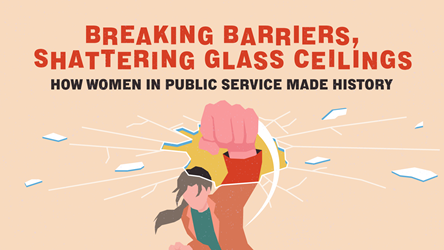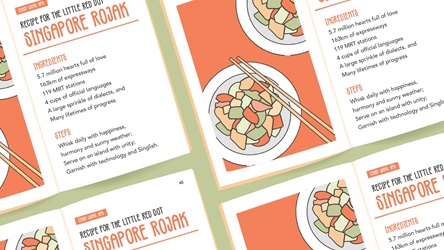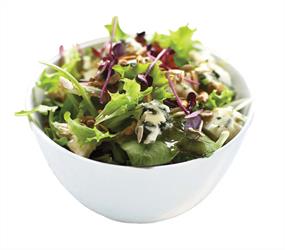Partnering The Community For Inclusiveness

In her 11 years in the retail sector, Ms Lynn Ng has dreamt up inventive ways to drive sales and traffic to shopping malls.
She has sent a mobile truck around Tiong Bahru for residents to play old-school games and win shopping vouchers, and installed capsule vending machines that dispense dining vouchers at bus stops.
The senior corporate communications manager at the National Council of Social Service (NCSS) has since put her experience to good use in the 2019 See The True Me campaign, which aims to encourage more visibility of persons with disabilities.
Now in its third run, the campaign has a new focus on building community partnerships, and encouraging the community to include persons with disabilities in their daily activities, such as employment and recreational activities. Ten partners have pledged their support, including KFC and Shangri-La’s Rasa Sentosa Resort & Spa.
In a digital era where savvy consumers are inundated “with thousands of brands every day”, selling a message can no longer be as “upfront or in your face”, said Ms Ng. “This has created a big shift, and that’s where the challenge and excitement comes in.”

Partnering LiHO TEA
A significant campaign partner is homegrown bubble tea brand LiHO TEA, a company Ms Ng worked with previously. The team found out that its new concept store’s opening in March 2019 lined up with the campaign’s timeline.
Wanting to showcase the abilities of persons with disabilities at “tangible touchpoints”, the NCSS team roped in Amelia, a student with autism from Very Special Arts Singapore. Amelia designed the mural for LiHO’s new store at Cathay Cineleisure. LiHO also crafted a special drink, named it Ren Ren Hao (Chinese for “everyone is good”) and paired it with cup sleeves that feature Amelia’s artwork.
LiHO has pledged to be an inclusive employer, with a goal to have the store entirely managed by people with special needs by 2020. It is in talks with various social service agencies, such as The Singapore Association for the Deaf, to start the hiring and training process.
Ms Ng said: “LiHO shows that inclusion is possible with a positive mindset and little tweaks to operations. All it takes is a willing heart and someone in the company to push things through.”

Rallying for inclusiveness
Getting the retailers’ support was not easy, with the NCSS team pitching to retailers as external partners for the first time. Potential partners were contacted as early as March 2018 to introduce the campaign and discuss collaborations.
But retailers preferred to abide by their own corporate calendars, which made it difficult to join forces during peak periods like Chinese New Year or the Great Singapore Sale. Meanwhile, engaging international brands required many layers of liaison and coordination.
The team also had to convince well-known brands to carry the campaign’s message. For instance, NCSS wanted KFC to roll out specially designed tray mats printed with tips on how to better interact with persons with disabilities. The messaging had to be tweaked to match KFC’s commercial goals, showing tips on how the public can interact with KFC staff with special needs instead.
Ms Ng, a former marketing communications manager at AsiaMalls Management, said her retail experience came in handy for “understanding how the business model works and what each retailer is looking for, so we can create a mutually beneficial relationship”.

Increasing interaction
The campaign strategy was guided by research findings from the NCSS’ Quality of Life and Attitude studies.
Public attitudes towards persons with intellectual disabilities and autism spectrum disorder were less favourable due to lack of awareness and interaction – so the team focused on changing such attitudes, said Mr Benjamin Tay, assistant director of NCSS’ sector research team.
To find the right campaign ambassadors, the team painstakingly reached out to its network of over 450 social service agencies, employers, and institutions of higher learning, over three months.
Narratives around persons with disabilities typically depict them as being beneficiaries or “at the receiving end”, said NCSS corporate communications manager Deng Qinyi, but there are many who contribute to the community. Campaign ambassador and wheelchair user Michael Quek is a regular volunteer for stroke causes, while Mr Conrad Puah Neo, who has an intellectual disability, has donated blood 67 times.
Ms Deng, who oversaw the public relations efforts for the campaign, added: “Even though Mr Puah Neo is unable to express himself well and is often misunderstood, that has never stopped him from giving back to his community.”
This year’s campaign also opens up more opportunities for interaction, such as Let’s Chat sessions at the National Museum of Singapore and OUE Social Kitchen. Participants get to converse with persons with disabilities, who are inclusion ambassadors from the Disabled People’s Association. The conversations are guided by a common theme, such as food or photography.
Shaping the future
The NCSS team members bring their different expertise and experiences to the table – from Ms Ng’s marketing know-how to Ms Deng’s PR expertise to Mr Tay’s gift with numbers.
The fourth team member, assistant manager of disability services Kimberley Cham, said working with the communications team was a “whole new ball game”. She usually works directly with social service agencies to manage programmes, but has found that “we can effect change in many different ways, and there are many ways to have the same outcome”.
Ms Cham’s role was in getting public agencies and grassroots partners, such as the National Library Board and People’s Association Water-Venture, to come on board.
Looking ahead, the team agree that partnership is the way to go.
“Communication is no longer just crafting a message. The true challenge is in making sure your message is heard, remembered, believed and practiced,” said Ms Ng. “By thinking outside the box and leveraging one another’s expertise, we can bring different people to work together.”
Future plans
As part of efforts to shift the attitudes of the community towards persons with disabilities, NCSS plans to create more awareness of the need to introduce inclusivity education for younger children as they “have no pre-conceived notions of disabilities”, said NCSS corporate communications manager Deng Qinyi. This includes reaching out to parenting blogs and magazines to help spread the message of inclusiveness to parents as they play an important role in shaping their children’s attitudes.
“At that age, as we start to create more disability awareness, it will sink in. And when they grow up, it’ll be a natural progression for Singapore to become a more inclusive and caring nation.”
- POSTED ON
May 7, 2019
- TEXT BY
Toh Ee Ming
- PHOTOS BY
catspace









